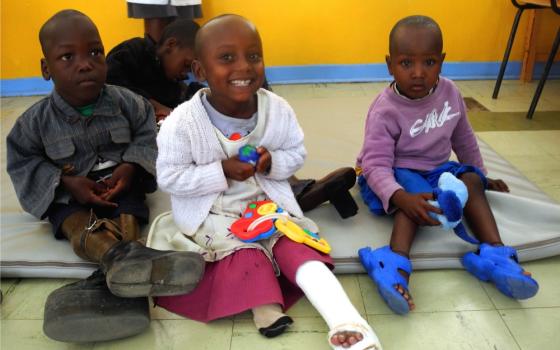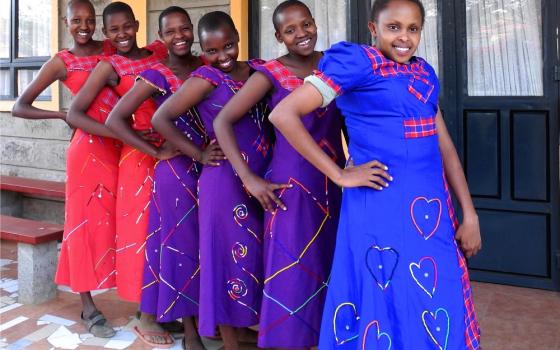Patience is not a virtue that many journalists possess in abundance. Curiosity? Yes. Tenacity? Stubbornness? Big yes to both of those. But patience, that’s one of those sneaky qualities that eludes me and most other journalists. We want the story, and we want it now.
My work reporting for Global Sisters Report has taught me a lot about patience, partly because patience and flexibility are requirements for anyone traveling in Africa. But my trip this month to Kenya impressed upon me the importance of patience, not only for sisters, but especially for myself.
In Kenya, I researched stories about how sisters are working with marginalized populations in rural areas and working to slowly change cultural perceptions. On the foothills of Mt. Kenya, Elizabethan Sisters run a center where almost 100 disabled children a year come for physical therapy and operations to correct their disabilities. The center started because when the sisters came to Naromoru in 1972, they went from house to house in the new parish and asked what the families needed. They found dozens of children afflicted by polio and other disabilities that could be corrected with surgery shut up in their homes.
The local culture in the villages forced families to hide their disabled children in shame, keeping them out of school though few had mental disabilities. Tradition held that disabilities were the result of a curse on a family, and sometimes families of disabled children were completely rejected by the community.
In the three decades since the center opened in 1982, that perception has slowly disappeared in the surrounding area. Children at the Naromoru Disabled Children’s Home attend the local school during their recovery and physical therapy, interacting with other children and the community. Isolation and shame has slowly changed into a warm embrace of the children at the center. The local Catholic Women’s Association organizes food donations and Christmas parties. Students from the local school sometimes carry their disabled friends home on their shoulders so they can still attend when the roads are too muddy and wet for crutches.
These results blossomed because of the process that sisters took. First, they identified the community’s needs. Then, they worked: quietly, steadily and patiently, trying to solve those needs. There were challenges and setbacks, but overall they pressed onward. In time, the community changed its position, not because the sisters forced people to do so, but because they could see tangible results from the sisters’ work.
Similarly, in the arid flatlands where Kenya’s Masai tribe live, two dedicated sisters from the Daughters of the Heart of Mary and a Rosminian priest run a rescue center for girls who are at risk of female genital mutilation or early forced marriage. The center started after outreach seminars organized by Loreto Sr. Ephigenia Gachiri, and the request of the tribal chief, who wanted a solution for girls who were running away to avoid FGM or marriage because they wanted to stay in school.
The cultural pressure for young girls to go through FGM is immense, despite efforts to educate the community about the dangers of this traditional practice. But in the past years since the center opened, and community has watched the girls who have not gone through FGM stay in school and excel. The results proved to the surrounding village that uncut girls can become capable and successful young women without this dangerous ritual. Again, it was the patient work of sisters – and the tangible result of this work – that slowly changed perceptions. When sisters worked patiently and slowly with the community, they were able to be the catalyst for radical change, which was much more powerful than when outside force try to force change too quickly.
I traveled to Kenya to report on the work of sisters, but also to try to understand how sisters in the media-savvy hub of east Africa get their news and how we can make Global Sisters Report a part of the information they access regularly. I pour my soul into my work for GSR, and I want sisters in Africa to become part of the conversation, part of the global network of sisterhood. And because I’m a journalist, I want this to happen right now.
I was heartened because for the first time when I introduced myself, sisters had heard of Global Sisters Report. Half a dozen sisters from Nairobi and one from Uganda told me they followed our extensive coverage on the apostolic visitation and appreciated the sister-centric reactions. The Pauline Sisters, who have their own worldwide media empire, had seen Chris Herlinger’s coverage of Sr. Anne Kiragu in South Sudan. Other sisters loved Caroline Mbounu’s columns from Nigeria, and one sister even recognized me from my headshot, which made me feel like a rock star.
Kenya is hurtling into the digital age with gusto, and sisters are joining the journey. Many superiors of Kenyan congregations have wavered over the issue of Facebook, trying to decide whether it is an important tool for connecting to young people and future vocations or a dangerous distraction (most have sided with Facebook, and the Association of Sisterhood of Kenya has a new Facebook page).
But GSR is still a fledgling website, and many sisters have not heard about us. Access to Internet and connectivity are pressing issues for many sisters who work in remote areas, so having them read GSR is still a distant goal.
But I believe, as do many of the sisters I met, that a network of support and connections like Global Sisters Report is part of the process of sisters’ adapting to the current world, as they have always done throughout history. I am lucky that the leadership of AOSK, including Sr. Agnes Wamuyu Ngure and their new social communications team, felt the same way – and were the biggest cheerleaders for GSR as I crisscrossed the country.
The digital world is a newer challenge, and sisters are slowly becoming more connected, reaching out through Twitter and Whatsapp to each other and the world. Slowly, as we grow in the coming years, I hope GSR will also be part of the sisters’ arsenal of tools, a network of support and ideas to help them grow and thrive. I have to remember that we’re still a new website, and change takes time.
I’m trying really hard to be patient.
[Melanie Lidman is Middle East and Africa correspondent for Global Sisters Report based in Israel. Follow her on Twitter @MelanieLidman.]



